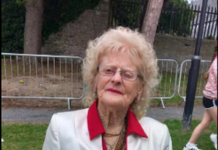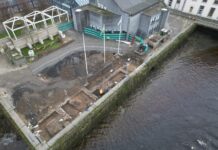
A LABOUR TD has called on the Minister for Justice to appoint an agency to carry out a national audit of coroners and cemeteries to establish the number of unidentified bodies in the State, in order to try to help families of missing persons perhaps find their missing loved ones.
The call, by Deputy Duncan Smith, comes exactly a month after gardai informed the family of Limerick man Denis Walsh – who was declared missing for 25 years – that his unidentified remains had actually been found four weeks after he went missing on March 9th, 1996.
It also emerged Mr Walsh’s remains were held in storage at the Mortuary at University Hospital Galway for 18 years, before being laid to rest at a Galway County Council communal graveyard in Bohermore, in 2014.
Gardai were notified on February 5th last, that because of advances in DNA profiling, it could be confirmed that human remains found on the shore at Inis Mor, on April 7, 1996, were that of Mr Walsh.
Denis Walsh’s family continue to ask questions as to how his body was not identified sooner, and why they had not been informed at the time of an unidentified partial body being found.
Mr Walsh’s parents said they dropped flyers with Denis’s photograph into Garda stations in Galway the day before discovery of remains on Inis Mor.
The couple returned to Galway a month later to drop more flyers around Galway, a day before gardai appealed for information on RTE Crimeline about the discovery of their son’s unidentified remains.
“There was no connection made, as far as we can see,” Denis Walsh’s brother, Paul, told this reporter last month.
“How come the gardaí at the time did not join up the dots sooner? Did no garda in Galway check what people were reported missing around that time, and was no garda in Limerick aware of a body being found in Galway? I’m not satisfied,” added the deceased’s heartbroken Denis Walsh snr.
The family have sought permission to exhume Mr Walsh’s remains and lay him to rest finally in his native Limerick.
Many other families of missing persons have now been left pondering whether their missing loved one’s remains have been buried or are they still be held in storage.
In a statement today, Deputy Duncan Smith said: “In Ireland, there are 823 missing persons files open. However, there is no record of how many remains have been interred in cemeteries, or remain in morgues, as the current rules regulating coroners does not compel them to report unidentified remains to a central system.“
“There is no one individual or authority with responsibility for collating all the unidentified remains that have been found in this country. We literally do not know how many unidentified remains have been interred in cemeteries or remain in morgues as rules regulating coroners does not compel them to report unidentified remains to a central repository.”
“This is set against a total of 823 current missing persons files currently open, the oldest dating back to 1951.“
Deputy Smith said coroners “are not compelled“ to report how many unidentified bodies are in the country, “which has led to the perverse situation where families of missing persons must go to individual coroners’ and graveyards to seek information relating to their loved one”.
“One family described this process as like going to 40 lost and found desks. At a time of horrendous heartbreak, it’s simply unacceptable that families of missing persons would be treated this way by the State,” he said.
“I am calling on the Minister for Justice to right this wrong for families. If coroners cannot find out the ‘how’, they certainly don’t have to find out the who.”
“The Corners must be compelled to keep records of unidentified bodies, identifying the cause of their death and opening a system that would reunite the remains of these people with their family and loved ones.“
“The media has gone above the call of duty for many of these families, searching for answers to these harrowing stories of loss. Instead of having families turn to journalists and the media to solve the mystery of missing persons, the State must play an active role in trying to solve these cases and bring truth to families after the headlines have moved on.”










